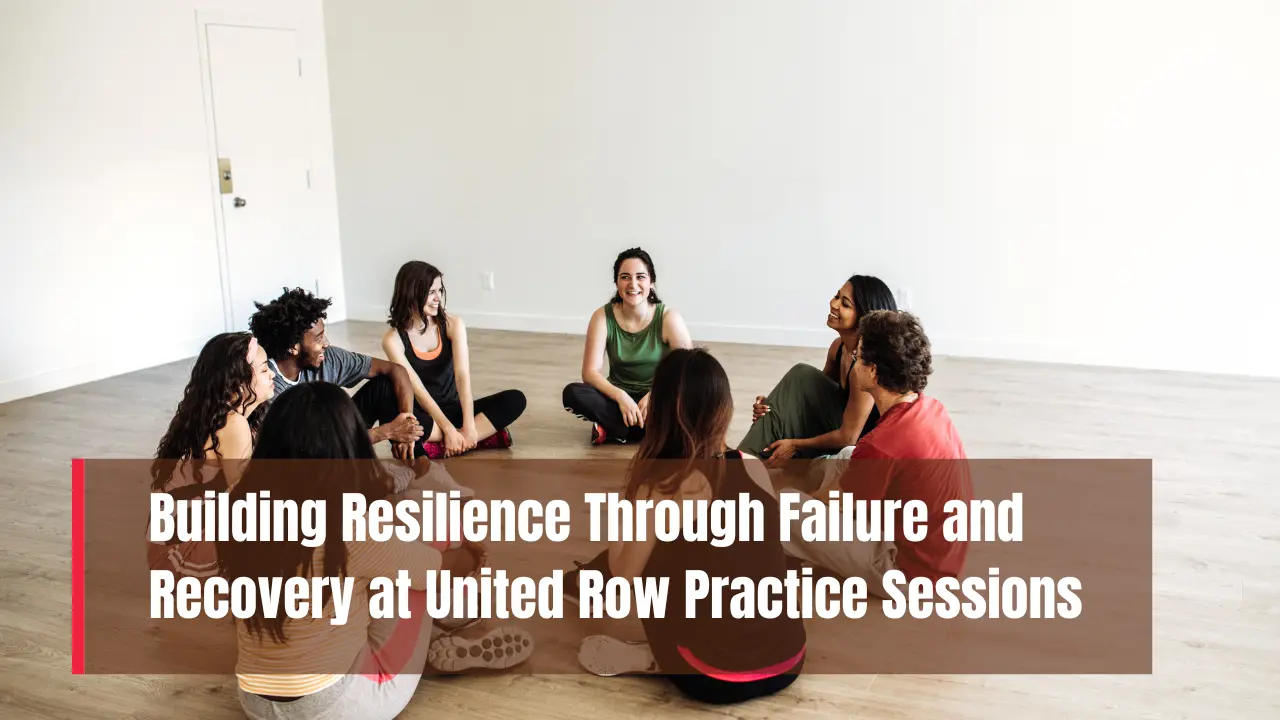Building Resilience Through Failure and Recovery: Building resilience through failure and recovery is not just a concept; it’s a lived experience for every athlete training at United Row. Here, mistakes are not feared but valued. The sweat, setbacks, and struggles during practice sessions become the driving force behind transformation. This is where ordinary athletes learn to rise from moments of breakdown, returning with a sharper mindset and renewed strength.
At United Row, the training culture is deeply rooted in embracing failure as a necessary part of growth. This article explores how consistent effort, reflection, and recovery shape the mental and physical stamina of rowers. It dives into the real-world application of resilience-building techniques, detailing what happens when failure becomes fuel for long-term success.
Building Resilience Through Failure and Recovery
This article centers on the power of building resilience through failure and recovery and how it’s actively cultivated in the high-performance environment of United Row practice sessions. Here, recovery is more than rest—it’s a complete mental reset. Failure is not weakness, but a stepping stone. The process of pushing past limits, learning from setbacks, and regaining focus is what molds stronger athletes. We’ll explore the routines, mindset shifts, and coaching approaches that turn struggle into strength and help rowers develop mental toughness that goes beyond the water.
Overview Table
| Aspect | Key Insight |
| Purpose of Failure | Helps identify weaknesses and opportunities for growth |
| Role of Recovery | Restores energy and sharpens mental focus |
| Mental Toughness | Built through consistency and self-reflection |
| Coaching Approach | Encourages progress through positive, actionable feedback |
| Peer Support | Boosts motivation and accountability |
| Impact on Performance | Improves stamina, confidence, and overall performance |
| Life Lessons | Builds discipline, patience, and emotional control |
| Long-Term Athlete Development | Resilience leads to sustainable performance gains |
The Role of Failure in Athlete Development
At United Row, failure is treated with respect. It’s not something to hide from; it’s something to face and study. When an athlete misses a stroke, loses rhythm, or struggles with endurance, it signals a chance to learn. This open mindset towards error is embedded in every training cycle.
Failure forces athletes to slow down, re-evaluate, and become aware of their gaps. Coaches at United Row emphasize failure not as an endpoint but as a critical checkpoint. Whether it’s falling short in team synchronization or not meeting a time goal, athletes learn to see these situations as part of the process. Over time, these failures create a foundation of wisdom that fuels better decision-making, focus, and adaptability.
Recovery as a Key to Growth
Recovery at United Row isn’t only about giving muscles a break—it’s about realigning the mind. When fatigue hits after intense practice or mental pressure builds after a tough session, structured recovery helps athletes get back on track. Recovery methods include quiet reflection, guided breathing, journaling, and strategic rest periods that allow rowers to return stronger.
By practicing mental resets consistently, rowers learn how to manage stress and protect their focus. This balance is crucial not only for avoiding burnout but also for making consistent progress. The better the recovery process, the quicker athletes bounce back from setbacks, a central part of building resilience through failure and recovery.
Key Habits That Promote Resilience
- Daily Session Reviews
After each session, athletes write down what went well and what needs work. This builds awareness and turns experiences into lessons. - Constructive Coaching Feedback
Feedback at United Row is future-focused. Instead of focusing on what went wrong, coaches ask: “What can we try next?” This keeps motivation alive. - Open Team Dialogue
Team huddles and check-ins create a safe space where athletes share struggles and insights. This builds empathy and helps normalize the ups and downs of training. - Visualizing Comebacks
Rowers are taught to visualize themselves recovering from mistakes. This boosts confidence and helps reduce the fear of failure. - Routine Adjustment
When something doesn’t work, athletes tweak their routines rather than quit. Flexibility builds staying power.
Challenges Faced During Practice
The path to peak performance is never smooth. Rowers at United Row face a variety of setbacks—from technical errors like blade control or boat balance to mental hurdles such as fear of failure or lack of motivation. Physical exhaustion is another common challenge, especially during back-to-back sessions or preparation for competitions.
But these challenges are never ignored. Each one is addressed directly, either through skill drills, coaching sessions, or recovery plans. The goal is not to eliminate struggle but to develop strategies for managing it. This approach reinforces the value of persistence and reinforces emotional resilience.
Lessons Learned from Setbacks
Failure teaches what no victory ever can. Athletes learn the art of patience when progress is slow. They develop accountability when realizing that cutting corners only delays results. Setbacks force honesty. They make athletes confront their weaknesses—and that confrontation becomes the birthplace of growth.
More importantly, these lessons extend beyond the sport. Athletes begin to carry a problem-solving mindset into other areas of life, showing up with more maturity, control, and self-awareness. Building resilience through failure and recovery becomes not just a training approach, but a life philosophy.
Top 2 Resilience-Building Practices at United Row
- Mindful Breathing and Focus Training
These are simple but powerful. Athletes practice focused breathing before each session to calm nerves and improve concentration. This habit helps manage anxiety and clears the mind. - Peer Support and Accountability Partners
Each rower partners with another to track progress and offer support. This system builds trust and pushes both individuals to stay consistent, even on off days.
How Coaches Encourage a Growth Mindset
Coaches at United Row don’t punish mistakes—they explore them. Their feedback style is positive but direct. Instead of highlighting what went wrong, they ask athletes how they felt, what they noticed, and what they want to try next time. This builds ownership and shifts the mindset from blame to curiosity.
When an athlete sees that a coach believes in their potential—even when they fail—it plants a seed of confidence that grows stronger with each session. It turns tough moments into teaching moments, helping athletes view failure as just one part of the learning arc.
Applying These Lessons Beyond Rowing
What’s learned in the boat doesn’t stay in the boat. Athletes take these lessons—how to recover, how to self-correct, how to stay steady under pressure—into every part of their lives. They become better students, more focused professionals, and stronger people overall.
The discipline to rise after failure is rare and valuable. And at United Row, it’s practiced daily. This is what makes the experience more than just sport—it becomes personal development in its rawest form.
Final Thought
At United Row, every drop of sweat, every misstep, and every rough session is treated as a lesson. The journey of building resilience through failure and recovery is not glamorous, but it’s real. And it works. Athletes walk away not just with better technique, but with sharper minds and stronger hearts. If you’re someone facing your own challenges—on or off the water—remember this: failure is not the opposite of success. It’s the path to it.
Feel free to share your story in the comments or let us know how you’ve turned failure into growth. And if you’re curious about what’s ahead, explore your horoscope or check out more insights into resilience and performance.












